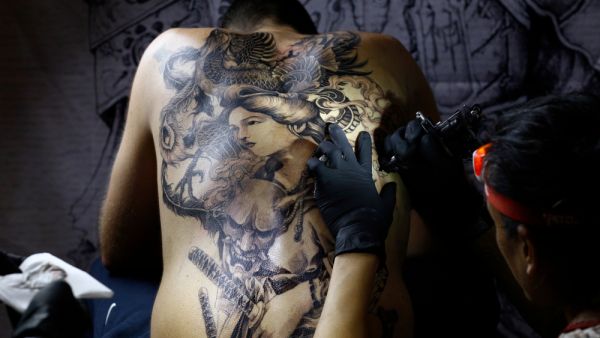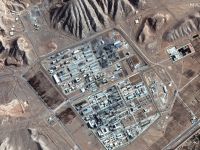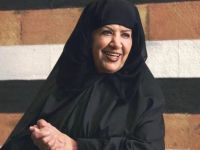With just a few of the artists at this year’s edition of Lebanon’s annual tattoo festival being women, one might expect female practitioners to have to fight hard to establish their place in the tattoo scene.
However, Ukrainian-born Daria Galina said she believed her “feminine touch” actually put her at an advantage in the industry.
“I think it’s very cool to be a female tattoo artist, it gives us extra opportunities,” she said, explaining that women often felt more comfortable getting their bodies inked by a female artist.
Many clients favor Galina, who tattoos elegant “dots and lines” designs from her Roumieh studio, for her “gentle hand and delicate style,” as opposed to an “intimidating” studio where men may “aggressively press the [tattooing] needle into the skin,” she said.
In the next booth over at the festival Sunday, American-born Shara Kentworthy set up her inks for her next client. “It’s kind of been to our benefit being female tattoo artists,” she said, also noting that women often feel more at ease getting inked by a female artist. She has been running a studio in Ashrafieh for over a year and a half, after learning the trade in Iraq’s Kurdistan region.
Kentworthy said Beirut undoubtedly had a stronger tattoo culture than Kurdistan, and that the gradual increase in women wanting tattoos had “opened up the culture even more. ... People are more open to custom ideas and original pieces.”
While she doesn’t apply the ink herself, Dede Dako has been designing tattoos for more than four years alongside her studies in interior and graphic design.
Despite strong objection from her family to her chosen career, she said she remained passionate about tattoos. “I tell them: It’s just art, but rather than pinning it up on the board or on a wall, you put it on your body,” she said.
Like Galina and Kentworthy, she said she felt that despite people continuing to react to inked Lebanese girls “as if they’re an alien,” it was becoming easier each year to be a woman working in the industry.
The size and popularity of the 2019 Lebanon Tattoo Festival, which saw more than 30 artists fly into Beirut - more than double the number who attended the inaugural event in 2017 - demonstrates an apparent shift in attitudes to tattoos more generally.
“Attitudes are changing for the better in Lebanon and everyone is getting tattoos - people with a religious background, college students, mothers with children,” Lebanese artist Ahmed Jomaa said.
“Tattoos are here to stay.”
The festival, held over the weekend, offered something for everyone, from those braving their first tattoo to seasoned collectors, with styles ranging from traditional old-school to more delicate line-and-dot work.
“We are putting Lebanon on the map with this event,” organizer Noura Jaroudi said, adding that this year’s edition had attracted artists from across the Middle East, including from Turkey and Egypt.
For those not wishing to get inked, gaming stations, beer pong and food and drink trucks provided a chance to relax and socialize.
Carol Mezher, sporting an impressive traditional tattoo depicting an avocado under a banner that read “VEGAN,” sold fresh vegan cookies while her partner Zahi got to work on an elaborate cover-up back piece.
“This year, it’s much more of a gathering and hangout place,” Jaroudi observed.
Khalil Haddad, who has been tattooing for more than 20 years, also noticed a dramatic change in attitudes toward tattooing in Lebanon.
“People used to say that anyone with tattoos was a gangster,” he said, “but now there are more than 1,000 artists in Lebanon.”
However, as commercial tattooing is still in its infancy in Lebanon, Haddad said he felt that many people here got tattoos as part of a trend, or for fashion, rather than “to express their personalities.”
“Very few people get tattoos that mean something to them,” he said.
Mark Farhat, who trained in Russia but works in Choueifat, said that the most popular styles in Lebanon, such as tribal tattoos, had long gone out of fashion in Russia.
To stay on the cutting edge, Farhat said he traveled regularly to Russia for extra training to master new styles, such as watercolor tattooing.
Lebanese artist Mohamed Rifaai expressed belief that Lebanon was on the right track toward establishing itself as a regional tattoo hub, but “we just need more time.” He suggested that Lebanese artists should spend time abroad training and learning about new styles to contribute to improving the scene at home.
But he said local events provided a great opportunity for artists to exhibit their work, gain exposure and meet others from the field.
Farhat agreed, adding that he wasn’t at the festival for “a business purpose,” but rather to spend time with other artists and build a community.
“People who know about tattooing stick together,” he said.
This article has been adapted from its original source.








